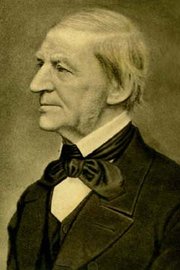The American Scholar
|
|
The American Scholar was a speech given by Ralph Waldo Emerson in 1837 to the Phi Beta Kappa Society in Cambridge, Massachusetts. He was invited to speak as a result of his ground breaking work, Nature, published a year earlier in which he established a new way for America's historically-young society to look at the world. The American culture was still heavily influenced by Europe 60 years after declaring independence, and Emerson was, for the first time in the country's history, providing a roadmap on how to escape from underneath that veil and build a new, American identity. Oliver Wendell Holmes, Sr. declared this speech to be America's "Intellectual Declaration of Independence."
There are a few key points he makes that flesh out this vision:
- "One Man" is the unity of all society working together to help each other, with one body part being no more important than the next.
- People need to see themselves as a part of the whole, as necessary and essential to all of society. He states, "Man is not a farmer, or a professor, or an engineer, but he is all."
- The "American Scholar" has an obligation, as "Man Thinking" within this "One Man" concept, to see the world clearly, not severely influenced by traditional/historical views, and to broaden our understanding of the world from fresh eyes, to "defer never to the popular cry."
- The scholar's education consists of three pursuits.
- Investigate and understand nature, which includes the scholar's own mind and person.
- Study "the mind of the Past" to gain new perspective and to try to "get at the truth."
- Take action -- interact with the world; do not become the recluse thinker commenting from afar.
- The scholar's duty or "office" is to "cheer, to raise, and to guide men by showing them facts amidst appearances."
- The scholar's education consists of three pursuits.
Building on the growing attention he was receiving from the essay Nature, this speech solidified his popularity and weight in America, a level of reverence he would hold through out the rest of his life.

